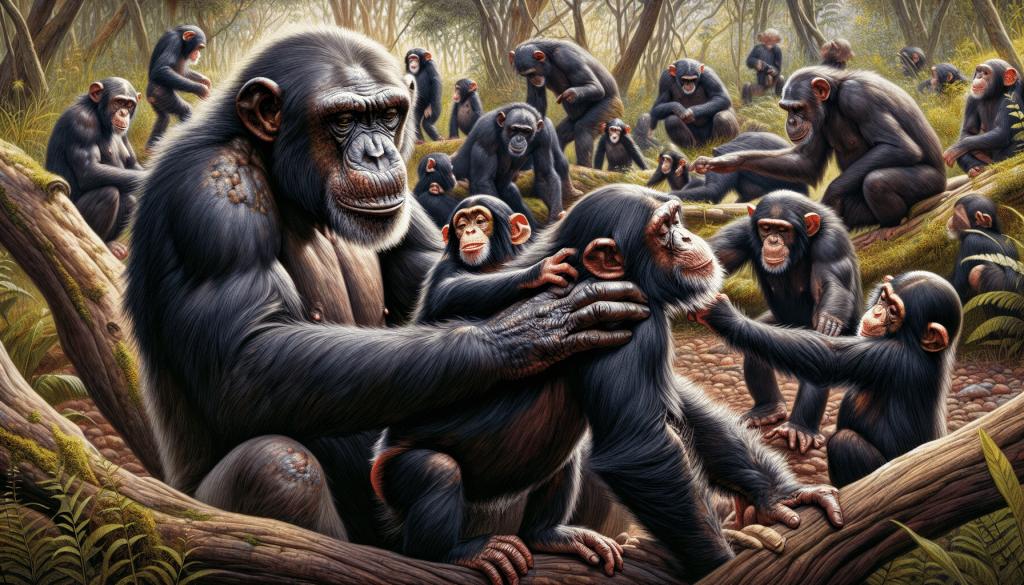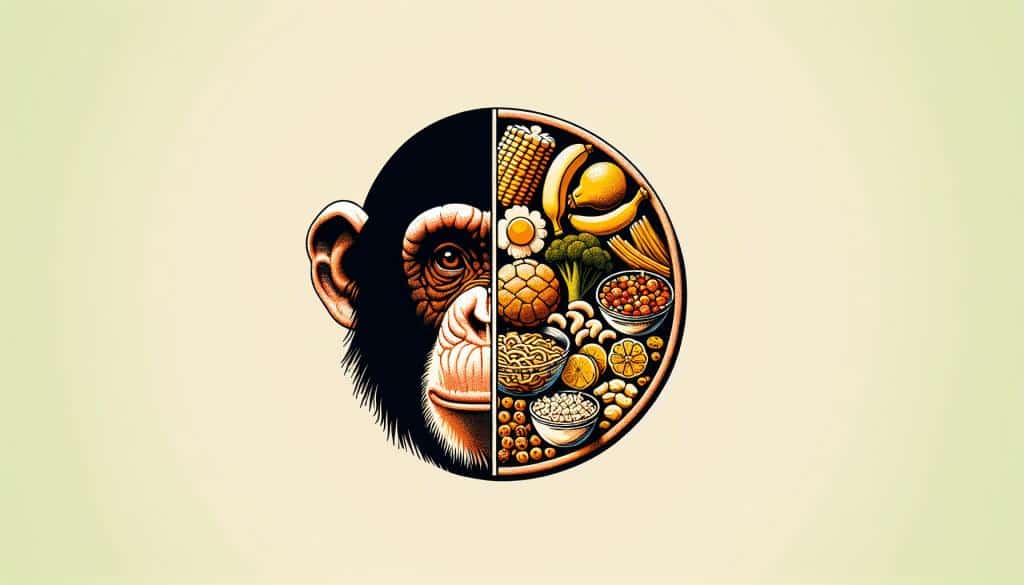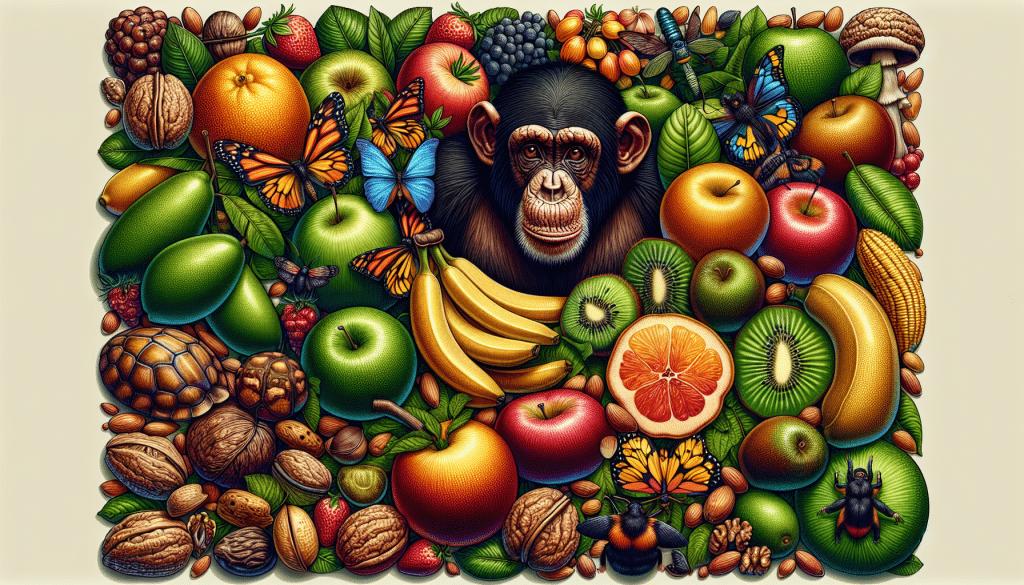Imagine yourself in a dense and mysterious forest, surrounded by the enchanting sounds of nature. In this world, chimpanzees – fascinating creatures with uncanny similarities to humans – thrive amidst intricate social dynamics. As you set foot into their captivating realm, it becomes clear that socialization plays a pivotal role in the lives of these intelligent beings. From their extraordinary communication methods to their complex social structures, the importance of socialization in chimpanzees unveils a mesmerizing tale of connection, learning, and shared experiences.
Understanding Chimpanzee Social Structure
Chimpanzees, our closest living relatives, are highly social animals that live in communities with complex social structures. By studying their socialization behaviors, researchers have gained insights into the hierarchical nature of chimpanzee societies, the role of socialization in determining status, the fluidity and complexity of their social bonds, and the impact of socialization on their health and well-being.

Hierarchy within Chimpanzee Communities
Chimpanzee communities are organized in a hierarchical manner, with dominant individuals occupying higher positions in the social ladder. These dominant individuals have more access to resources, such as food and mates, and exert control over others in the group. The social hierarchy is established through displays of dominance, aggression, and submission, which are key components of chimpanzee socialization.
Role of Socialization in Determining Status
Socialization plays a crucial role in determining the status of individual chimpanzees within a community. Through interactions with others, chimpanzees learn the social norms and expectations of their group, which ultimately shape their behavior and social standing. Chimpanzees that display strong social skills, such as effective communication, cooperation, and strategizing, are more likely to attain higher status within their community.
The Fluidity and Complexity of Chimpanzee Social Bonds
Chimpanzee socialization involves the formation and maintenance of complex social bonds. These bonds can be both positive and negative, depending on the nature of the relationship. Chimpanzees form strong bonds with their mothers and other family members, which provide emotional support and protection. They also form alliances and friendships with other individuals, which can be important for cooperation in activities such as hunting and defending territory.
Socialization at Different Life Stages
Chimpanzee socialization begins at birth and continues throughout their lives. Different life stages present unique opportunities for social learning and development.
Mother-Infant Bonding and Early Social Skills
The bond between a mother and her infant is crucial for the survival and social development of the young chimpanzee. The mother provides care, protection, and teaches essential social skills, such as grooming, sharing food, and identifying social hierarchies. This early socialization sets the foundation for the infant’s future interactions within the community.
Juvenile Play Periods and Learning Social Cues
During their juvenile period, chimpanzees engage in play behavior, which serves as a vital means of socialization. Through play, young chimpanzees learn important social cues, such as body language, vocalizations, and appropriate behaviors within the group. Play also fosters cooperation and helps develop problem-solving skills, enhancing their social competence.
Integration of Adolescents into Adult Groups
As chimpanzees transition into adolescence, they undergo the process of integrating into adult groups. This period is characterized by increased independence and exploration, as well as the establishment of new social relationships. Adolescent chimpanzees learn from observing and imitating the behaviors of older individuals, further refining their social skills and solidifying their place within the community.
Socialization in Adult Chimpanzees and Maintaining Bonds
Even in adulthood, socialization remains essential for chimpanzees. Adult chimpanzees maintain their social bonds through various behaviors, such as grooming, sharing food, and engaging in affiliative behaviors. These interactions strengthen the bonds within the group and contribute to the overall stability and cohesion of the community.
Communication Skills in Chimpanzee Socialization
Communication plays a vital role in chimpanzee socialization, enabling individuals to convey messages, maintain social bonds, and settle conflicts.
Use of Vocalizations in Social Interaction
Chimpanzees utilize a variety of vocalizations to communicate with one another. These vocalizations can express emotions, relay warnings, or facilitate coordination during activities such as hunting. By understanding and responding to vocalizations, chimpanzees are able to establish social hierarchies, form alliances, and coordinate group activities.
Gestural Communication and Its Role in Socialization
In addition to vocalizations, chimpanzees rely heavily on gestural communication to convey meaning and maintain social relationships. Gestures such as reaching, pointing, and grooming serve as important signals of intention, affiliation, and submission. Through gestural communication, chimpanzees are able to negotiate social interactions, express empathy, and reinforce social bonds.

Facial Expressions and Body Language in Conveying Messages
Chimpanzees display a wide range of facial expressions and body language, which are essential for conveying messages within their communities. Facial expressions, such as smiles, grimaces, and threats, communicate emotions and intentions. Similarly, body language, such as posture, gestures, and physical contact, provides additional cues about an individual’s social status, confidence, and willingness to engage in social interactions.
Social Learning among Chimpanzees
Chimpanzees are highly intelligent and demonstrate remarkable abilities for social learning, allowing them to acquire new behaviors and knowledge from others within their group.
Imitation and Social Learning in Young Chimpanzees
Young chimpanzees learn through imitation, observing the behaviors of older individuals and replicating them. This form of social learning helps young chimpanzees acquire essential skills, such as tool use, foraging techniques, and communication strategies. By imitating others, young chimpanzees become proficient in social behaviors, allowing them to integrate effectively within their community.
Teaching and Knowledge Transmission in Chimpanzee Groups
Chimpanzees also engage in teaching behaviors, actively transmitting knowledge and skills to younger individuals. Older individuals, often referred to as “teachers,” demonstrate specific behaviors and techniques to younger chimpanzees, facilitating their learning process. This form of knowledge transmission enhances the social bonds within the community and ensures the preservation and continuation of important cultural practices.
Innovation and the Spread of New Behaviors through Socialization
Chimpanzees are also capable of innovation, developing new behaviors through trial and error. Once a new behavior is discovered, it can spread within the community through socialization. Other individuals observe and learn the new behavior, leading to its diffusion and integration into the group’s repertoire. This process highlights the dynamic nature of chimpanzee socialization and the potential for cultural evolution within their communities.
The Role of Play in Social Development
Play behavior plays a crucial role in the social development of chimpanzees, contributing to their cognitive, emotional, and social well-being.
Physical Play and Learning Social Boundaries
Physical play, such as wrestling and chasing, helps young chimpanzees learn about their own physical capabilities and develop social boundaries. Through play, they learn to recognize and respect the limits of others, refine their motor skills, and practice social interactions, such as taking turns and initiating play with appropriate signals.
Cognitive Aspects of Play and Problem-Solving
Play also stimulates cognitive development in chimpanzees. Play scenarios often involve problem-solving tasks, such as puzzle solving, tool use, and creative problem-solving. These cognitive challenges enhance their problem-solving skills, promote innovation, and contribute to their overall adaptability within their environment.
Empathy and Perspective-Taking During Play Scenarios
During play, chimpanzees engage in perspective-taking and display empathy towards their playmates. They demonstrate an understanding of their play partner’s emotions and adjust their behavior accordingly. This empathy and perspective-taking contribute to the formation and maintenance of social bonds, promoting cooperation, and reducing conflict within chimpanzee communities.
Conflict and Reconciliation in Chimpanzee Socialization
Conflict is an inevitable aspect of social life, and chimpanzees are no exception. However, chimpanzees have developed mechanisms for conflict resolution and reconciliation that help maintain social stability within their communities.
Understanding Aggression and Competition Among Chimpanzees
Chimpanzees engage in aggressive behaviors, such as displays, threats, and physical confrontations, as part of their social interactions. Aggression and competition are primarily driven by the need to establish dominance, secure resources, and protect one’s social standing. Through aggression, chimpanzees communicate their status and intentions, while also reinforcing social hierarchies.
Reconciliation Behaviors after Conflicts
Following conflicts, chimpanzees engage in post-conflict reconciliation behaviors. These behaviors aim to repair damaged social relationships and reduce tension within the group. Reconciliation behaviors often involve affiliative interactions, such as grooming, embracing, and sharing food. By engaging in these behaviors, chimpanzees reaffirm their social bonds and restore harmony within the community.

The Importance of Social Bonds in Conflict Resolution
Chimpanzee social bonds play a crucial role in conflict resolution. Strong social bonds foster trust, cooperation, and support among individuals, reducing the likelihood of conflicts escalating. Chimpanzees with stronger social bonds are more likely to engage in pro-social behaviors, such as sharing resources and intervening in conflicts, contributing to the overall stability and well-being of the community.
The Impact of Socialization on Chimpanzee Health and Well-being
Socialization has a significant impact on the health and well-being of chimpanzees, both physiologically and psychologically.
Psychological Effects of Social Deprivation
Social isolation or deprivation can have severe psychological effects on chimpanzees. Socially deprived individuals often exhibit signs of stress, anxiety, depression, and abnormal behaviors. Lack of social interactions and bonds can lead to the deterioration of their mental health, emphasizing the crucial role of socialization in promoting emotional well-being.
Physical Health Benefits of Active Socialization
Active socialization has been linked to various physical health benefits in chimpanzees. Socially engaged individuals experience lower stress levels, enhanced immune function, and reduced susceptibility to diseases. Social support and cooperation within the community also provide protection against predators and facilitate the sharing of resources, promoting overall physical well-being.
Longevity and Life Satisfaction in Relation to Social Bonds
Chimpanzees with strong social bonds tend to live longer and have higher life satisfaction. Socially connected individuals enjoy emotional support, participate in cooperative activities, and experience a sense of belonging within their community. These factors contribute to their overall well-being, leading to increased longevity and improved quality of life.
Cultural Variations in Chimpanzee Socialization
Chimpanzee socialization practices can vary among different communities, giving rise to cultural variations within the species.
Regional Differences in Social Behaviors
Chimpanzee communities in different regions exhibit distinct social behaviors that are influenced by their unique ecological and social environments. These regional differences can be observed in behaviors such as tool use, hunting techniques, and social customs. The study of these cultural variations offers valuable insights into the flexibility and adaptability of chimpanzees as a species.
Culture-Specific Tools and Techniques Learned through Socialization
Socialization plays a crucial role in the transmission of culture-specific tools and techniques among chimpanzees. Young individuals learn these skills by observing and imitating older individuals within their community. The acquisition and refinement of these cultural practices contribute to the survival and adaptation of chimpanzee groups in their specific habitats.
Cultural Transmission and the Role of Elders
Elders within chimpanzee communities play a significant role in cultural transmission. Their extensive knowledge and experience are passed down to younger individuals, ensuring the preservation and continuity of important cultural practices. The presence of elders within the community promotes social learning and contributes to the overall cohesion and stability of the group.
Chimpanzee Societies and Inter-group Socialization
Chimpanzee communities occasionally come into contact with neighboring groups, leading to inter-group socialization and potential gene flow.
Inter-group Encounters and Their Importance
Inter-group encounters play a crucial role in chimpanzee socialization. These encounters allow for social interactions, cooperation, and exchange of individuals between groups. Inter-group socialization contributes to the genetic diversity and long-term survival of chimpanzee populations, promoting adaptability and resilience to changing environmental conditions.
The Role of Emigration and Immigration in Socialization
Emigration and immigration are important processes in inter-group socialization. Chimpanzees may choose to leave their natal group and join another, introducing new genes and promoting gene flow. Through immigration, chimpanzees have the opportunity to establish new social bonds, learn from different communities, and contribute to the social dynamics of the receiving group.
Gene Flow and the Genetic Importance of Socialization between Groups
Gene flow, facilitated by inter-group socialization, enhances genetic diversity within chimpanzee populations. Genetic diversity is vital for the long-term survival and adaptability of the species, as it increases the chances of individuals possessing beneficial traits to cope with environmental changes. The exchange of genetic material through socialization between groups plays a fundamental role in maintaining the genetic health of chimpanzee populations.
Human Influence on Chimpanzee Socialization
Human activities, such as habitat destruction, research, and tourism, can have profound effects on the socialization behaviors of chimpanzees.
Human Encroachment and the Disruption of Socialization
As human populations expand and encroach upon chimpanzee habitats, socialization patterns and behaviors can be disrupted. Habitat destruction can fragment chimpanzee communities, limiting their opportunities for social interactions and complicating inter-group socialization. Human interference can lead to changes in social dynamics, stress, and reduced overall well-being for chimpanzees.
Effects of Research and Tourism on Natural Social Behaviors
Chimpanzee research and tourism can both positively and negatively impact their natural social behaviors. Research has provided valuable insights into chimpanzee socialization, but the presence of observers can influence their natural behavior. Similarly, tourism can create opportunities for income generation and conservation efforts, but it can also disrupt natural social interactions and expose chimpanzees to potentially harmful human behaviors.
Educational and Ethical Considerations for Human-Chimpanzee Interactions
It is crucial to approach human-chimpanzee interactions with careful consideration for ethical and educational aspects. Respecting the natural behaviors and social dynamics of chimpanzees is essential to their well-being and conservation. Education and awareness programs can promote responsible tourism, research practices, and sustainable conservation efforts, ensuring that human-chimpanzee interactions are both educational and ethically sound.
In conclusion, understanding chimpanzee socialization is key to comprehending their complex social structures, communication skills, social learning, play, conflict resolution, and overall well-being. Chimpanzees’ ability to socialize and maintain social bonds is fundamental to their survival and cultural transmission. As human observers and cohabitants of their habitats, it is our responsibility to respect and protect their socialization behaviors while also learning from their remarkable social abilities.


